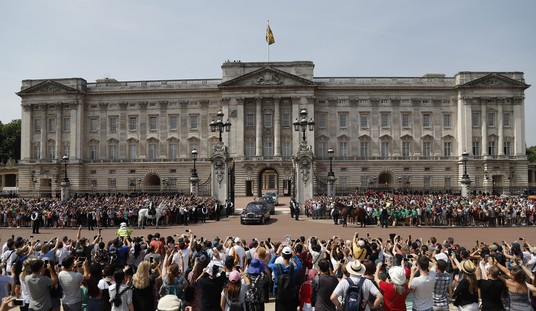Secretary of State Clinton is warning Syrian dictator Bashar Assad that he “is not indispensable and we have absolutely nothing invested in him remaining in power,” a marketed escalation in rhetoric following attacks on the U.S. and French embassies that were undoubtedly orchestrated by the Syrian regime. The statement is just short of a direct call for Assad’s resignation, though that is likely to come soon.
About 300 pro-Assad “protesters” attacked the U.S. embassy, tearing down plaques, spray-painting anti-American slogans, and breaking windows and security cameras. The French embassy was also assaulted, and live ammunition was used to protect the facility. The State Department says the state-controlled television inspired the attacks, and a resident said perpetrators were members of the regime’s Alawite Shabbiha militia, four buses of which were brought in from Tartous. The attack was retaliation for a bold visit to Hama by the American and French ambassadors on Thursday to express solidarity with the hordes of protesters demanding regime change. They were greeted by cheering residents, who put flowers and olive branches on their vehicles.
The images of appreciation for the U.S. and France made the regime sweat, as they should. The Assad regime has long dissuaded the West from supporting its opposition by playing on fears that anti-Western Islamists are bound to come to power in its absence. One example is the riots that happened in Syria following the publication of the Danish cartoons mocking Mohammed. A cable released by WikiLeaks shows that the regime manufactured the radical Islamic protests in its country to send the message: “We are the only thing standing between you and the Islamist hordes,” in the words of a source quoted in the file.
This campaign has gone into overdrive since the revolution began, as I’ve written about here in PJM. Since then, the regime’s television has broadcasted “confessions” of jihadists who claimed responsibility for the violence in the country, stating their goal as the creation of an Islamic state. Predictably, the so-called terrorists said they received their weapons from supporters in Lebanon, supporting the regime’s propaganda that Lebanese opponents of Assad like Saad Hariri are arming radical Islamic terrorists. Clinton’s strong statement shows that the Obama administration is not buying into the regime’s propaganda that no better alternative to it exists.
The reception that the U.S. and French ambassadors in Hama received also disarms critics of “meddling” in Syria’s internal affairs. They often argue that such interference is not desired by the opposition, as that would delegitimize them. By the same token, if the regime felt that U.S. support for the opposition undermined their cause, they would welcome it. The positive reaction stands in sharp contrast to how the Syrian protesters have burned the flags of Iran, Russia, and Hezbollah for their support of the Assad regime. These implications are exactly why the attacks on the embassies were hatched. The regime cannot allow the West to believe that supporting the opposition is a viable option, as it would represent a mortal threat to its survival.
Clinton also said that Assad “has lost legitimacy.” This sounds obvious, but it’s a significant statement. The U.S. originally said that Assad was “losing” legitimacy. President Obama then said that Assad must oversee a democratic transition or “get out of the way.” Last month, Clinton said that his legitimacy was “if not gone, nearly run out.” Now, finally, the U.S. is saying it is “lost.” That seemingly minor change in language represents a major shift in policy, even if the politically toxic words of “regime change” are not used.
And it’s about time. The Assad regime is a card-carrying member of the “hate America” team. It has sponsored terrorists, including members of al-Qaeda. It has helped kill U.S. and Iraqi soldiers in Iraq. It’s tied to Iran’s hip, and is a primary backer of Hamas, Hezbollah, and other terrorist groups. It pursues weapons of mass destruction and spreads the ideology of radical Islam even if its governance is secular. What else does it have to do to be treated as an enemy regime worthy of replacement?
The chances that Islamists take over Syria following Assad’s downfall are not as high as often thought, and neutrality does nothing to undermine such anti-American elements. The best strategy is to get involved, assisting the democratic aspirations of an oppressed people and wrecking decades of anti-American propaganda in the process. In so doing, the West helps remove a stalwart enemy and foster a more hospitable environment to our interests, especially if a robust effort is put towards assisting secular liberals.
The revolution in Syria is an opportunity to dramatically alter the balance of power in the Middle East in our favor. We better not miss it.
ALSO READ BARRY RUBIN’S “U.S. Policy on Syria Changes For the Better, Sort Of.”









Join the conversation as a VIP Member